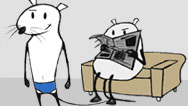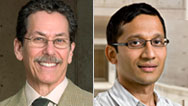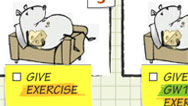Aiding Aging Muscles
- Posted 05.01.09
- NOVA scienceNOW
As we age, we almost inevitably lose muscle mass. What's more surprising is that a mere 10 days of bed rest can have the same impact on muscles as roughly 15 years of aging. Could new drugs that mimic the effects of exercise help prevent devastating muscle loss?
Transcript
Aiding Aging Muscles
Posted: May 1, 2009
[Conversation between ZIYA TONG and Randy Tardy]
ZIYA TONG: Randy Tardy is typical of a growing population of elderly people who could someday benefit from a drug that offers the same advantage as exercise does.
RANDY TARDY: Parts of my body, in particular my muscles, were not what they were ten years ago, twenty years ago when I was a teenager, and I realized that all of a sudden I couldn't do some things as easily as I could when I was much younger.
RON EVANS (Salk Institute): A lot of people even when they're young don't exercise, and it's even harder as you get older to develop that habit.
ZIYA TONG: Even elderly people who do exercise are vulnerable to muscle loss. BILL EVANS (University of Arkansas, Medical Sciences): In some older people there are bouts of illness or depression that cause almost a catastrophic decrease in muscle function, such as hospitalization. And so often times we see someone who is fully functional go into a hospital, and five or six days later they come out of the hospital hardly able to walk.
ZIYA TONG: Bill Evans' lab was the first to publish a study on the effects of enforced bed rest in older people. To take part in the experiment, you have to be at least 60 and be willing to stay in bed for ten days straight.
PATRICIA TOYE: They do not want you sitting up. They give you two pillows. You can have two pillows and that is it.
ZIYA TONG: Patricia Toye had been in bed for nine days and had 24 hours to go when we met her.
PATRICIA TOYE: Just laying here and you realize you're not getting up, you're not exercising, and I'm thinking what's this going to do to me at the end of my ten days? Will I be able to get back to the way I was at my age?
BILL EVANS: What we see is that ten days of bed rest is equivalent to about 15 years of aging. Now she's losing a lot of muscle. She loses about a kilogram, more than two pounds of muscle just from her legs.
ZIYA TONG: Patricia Toye was also losing something at a microscopic level inside her muscles. She showed very low levels of mitochondria, the tiny structures within cells that produce energy. No exercise for ten days had caused her mitochondria count to plummet. Could a drug reverse the effect? In laboratory mice kept inactive, a drug called AICAR is producing striking results.
ZIYA TONG: [To researcher] This is the animal that didn't have any of the drug?
RON EVANS: This is the animal that didn't have any drug, and this is the transformation that occurs simply injecting a drug once a day for a month. Is able to transform muscle into this type of muscle that looks as if it's been exercised that whole time. This looks like the muscle of an athlete.
ZIYA TONG: A pill that could give us more energy and transform our muscles may be closer than we think.
RON EVANS: It's not approved yet. You can't prescribe it, but it's moving in that direction, and that creates some real hope that this can turn into an actual human study.
ZIYA TONG: So do you think there will ever be a day when drugs replace exercise altogether?
BILL EVANS: I certainly hope not. I don't think that it will. I think the effects of exercise are nothing short of amazing. What the hope is is that someone who is old can use a drug to help them become more active.
Credits
- Produced for NOVA scienceNOW by
- Julia Cort
- Video
- © WGBH Educational Foundation
Related Links
-

Marathon Mouse
With an "exercise pill," researchers turn couch-potato rodents into champion runners.
-

Aging
Will research into "longevity genes" help us live longer and healthier lives?
-

Marathon Mouse: Expert Q&A
Ron Evans and Vihang Narkar of the Salk Institute answer questions about "exercise in a pill," burning fat, and more.
-

Discovering Exercise in a Pill
Try our mouse-racing experiments to learn how drugs that mimic exercise were discovered and how they work.



